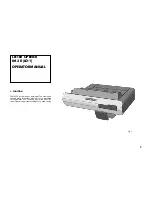
GENERAL INFORMATION
NOTICE:
This product is intended for commercial use only. Not for household use.
CAUTION:
These models are designed, built, and sold for commercial use. If these models are
positioned so the general public can use the equipment make sure that cautions, warnings, and
operating instructions are clearly posted near each unit so that anyone using the equipment will
use it correctly and not injure themselves or harm the equipment.
WARNING:
Check the data plate on this unit before installation. Connect the unit only to the voltage
and frequency listed on the data plate. Connect only to 1 phase as listed on the data plate.
WARNING:
Install per the spacing requirements listed in the installation section of this manual. We
strongly recommend having a competent professional install the equipment. A licensed electrician
should make the electrical connections and connect power to the unit. Local codes should always be
used when connecting these units to electrical power. In the absence of local codes, use the latest
version of the National Electrical Code.
WARNING:
This device should be safely and adequately grounded in accordance with local
codes, or in the absence of local codes, with the National Electrical code, ANSI/NFPA 70, latest
edition to protect the user from electrical shock. It requires a grounded system and a dedicated
circuit, protected by a fuse or circuit breaker of proper size and rating. Canadian installation must
comply with the Canadian Electrical Code, CSAC22.2, as applicable.
NOTICE:
Local codes regarding installation vary greatly from one area to another. The National
Fire Protection Association, Inc. states in its NFPA96 latest edition that local codes are “Authority
Having Jurisdiction” when it comes to requirement for installation of equipment. Therefore,
installation should comply with all local codes.
WARNING:
SHOCK HAZARD
De-energize and lock-out all power to equipment before
performing any maintenance, servicing or, cleaning of the equipment.
WARNING:
SHOCK HAZARD
Never clean any electrical unit by immersing it in water.
WARNING:
SHOCK HAZARD
-
Operators should not open any panels that require the use of tools.
IMMEDIATELY INSPECT FOR SHIPPING DAMAGE
All containers should be examined for damage before and during unloading. The freight carrier has
assumed responsibility for its safe transit and delivery. If equipment is received damaged, either apparent
or concealed, a claim must be made with the delivering carrier.
A) Apparent damage or loss must be noted on the freight bill at the time of delivery. It must then be signed
by the carrier representative (Driver). If this is not done, the carrier may refuse the claim. The carrier can
supply the necessary forms.
B) If concealed damage or loss is not apparent until after equipment is uncrated, a request for inspection
must be made to the carrier within 15 days. The carrier should arrange an inspection. Be certain to hold all
contents and packaging material.
Installation and start-up should be performed by a qualified installer who has thoroughly read, understands
and follows these instructions.



































